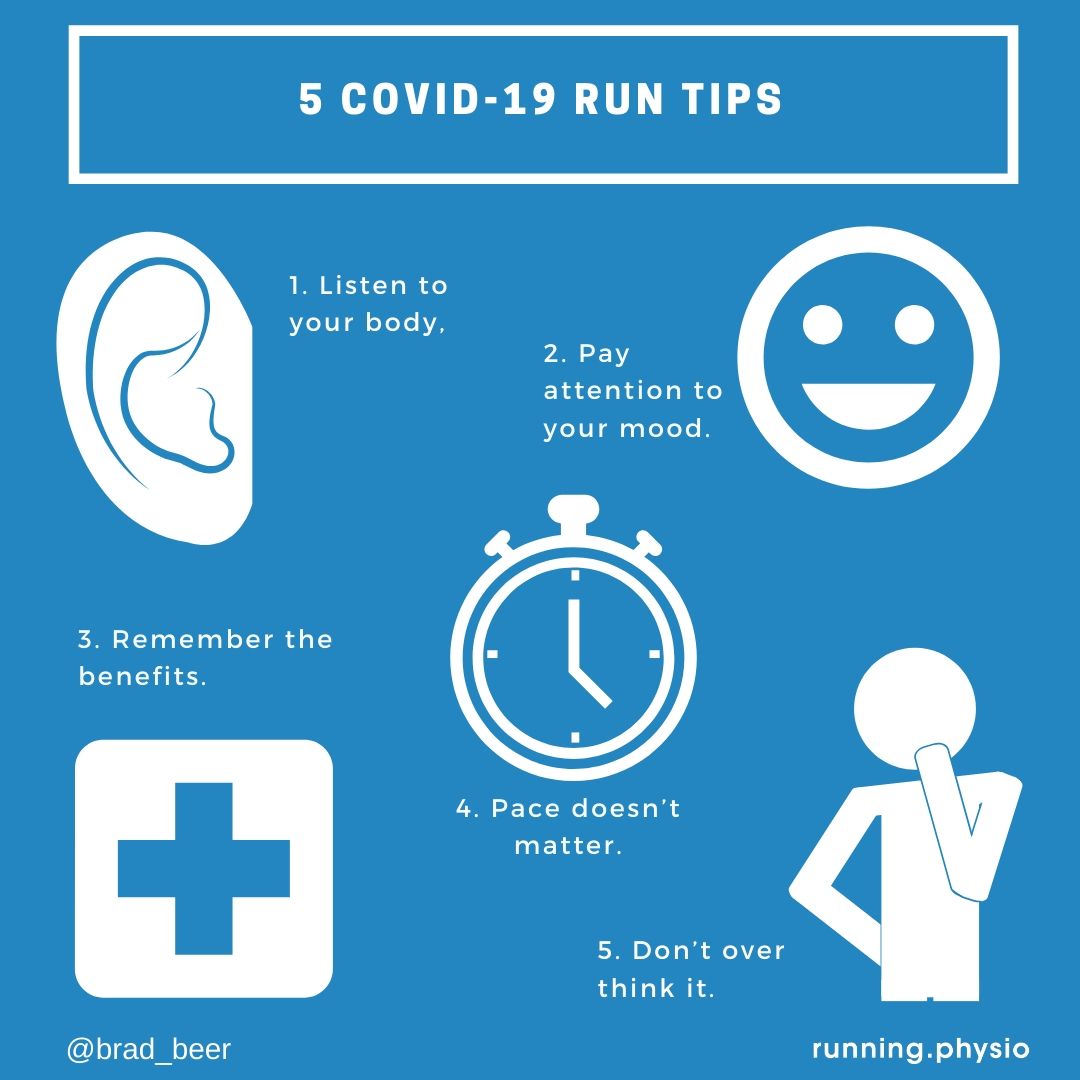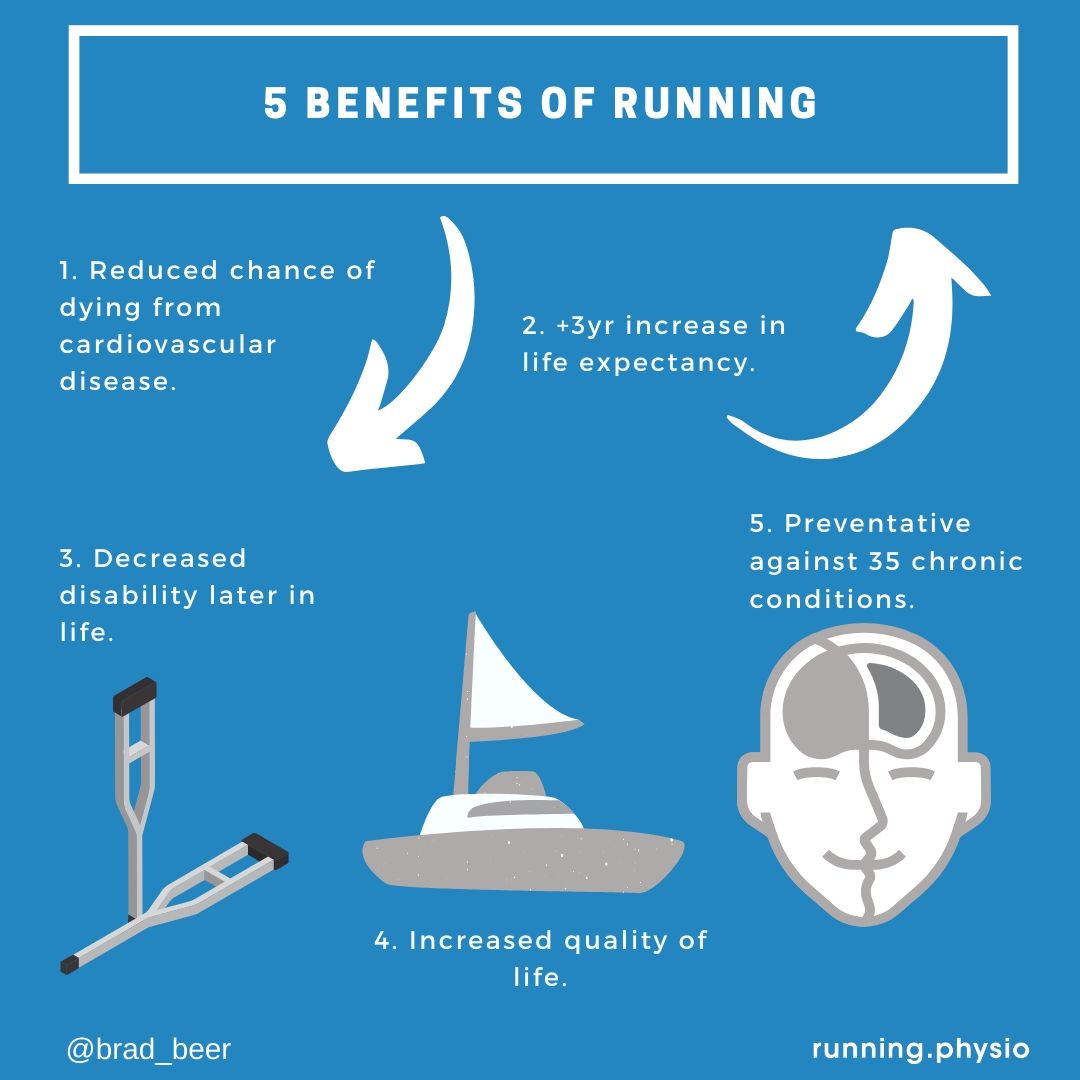Running is not the cure for the current worldwide COVID-19 pandemic.
But for runners maintaining and benefiting from the many known health benefits derived from running is key for health and well-being throughout the current pandemic restrictions.
Now more than ever we look to our running to provide some certainty in what are uncertain and challenging times. The psychological benefits of running are well recognised. These benefits can make a real difference in challenging times, such as what we are now all being required to navigate.
As such now is not the time to be forced to sit on the side line through injury.
In order to assist runners in attempting to remain injury free throughout the pandemic I have pulled together my five tips to assist a runner in remaining injury free.
My top 5 tips are shown below in this infographic and below:

1. Listen to your body:
Dr Shona Halson, former head recovery scientist and physiologist for the Australian Institute of Sport, and Australian Olympic team cites listening to your body is an essential skill for athletes of any level. As simple as ‘listening to your body sounds’ it remains often overlooked, and under recognised for importance in remaining healthy and injury free.
Listening to your body is linked to a better ability of the body to absorb training loads, and therefore adapt to a new level of functioning/performance. With the additional and significant stressors that this pandemic is generating for people and runners worldwide- it really is crucial for a runner to tune in and listen to the signals that the ‘body is giving out’. These signs and signals may range from a general feeling of fatigue and apathy, through to full blown sickness.
2. Pay attention to your mood:
Similar to tip 1 above – recovery scientists concur that mood assessment is as valid of indication as any regarding an athlete’s readiness to train and their adaptation to training loads. If you feel irritable, frustrated, angry, or despondent for example note that it not be wise to ‘push’ your running. Rather consider running at a level that is not pushing yourself on that given day. A simple mood assessment can be asking yourself ‘how am I feeling today?’
3. Remember the benefits:
With events cancelled the motivation and enjoyment derived from achieving a goal related to an event are not currently attainable. Now is a good time to reflect and focus on the many known health benefits of running. Concentrating on these benefits can serve as a sustainable source of motivation. Some of the many known benefits are captured in the below infographic.
Also of note are the psychological health benefits of running. These benefits are important in a time of anxiety and uncertainty such as what we are expediting with the pandemic. Psychologically running has been shown to:
- Running can produce the same changes in the brain as many antidepressant medications: specifically increasing neurotransmitters as well as creation of new brain cells. Even the hippocampus, a brain structure often shrunken in people with depression, increases in size over time after a regular exercise intervention.
- Across several studies, regular exercise reduced anxiety, but only aerobic exercise such as running contributed to this reduction.
- A couple different studies by the University of Maryland looked specifically at the calming effect of exercise. They found that when people were engaging in moderate intensity exercise, they were more drawn to pleasant images, but also paid closer attention to them to the point of not noticing the unpleasant images as often. They also found that exercise carried a prolonged calming effect, well past the end of the exercise session. Take away: running resets your mind to a more positive mindset and the result is carried with you after you are finished;
- At least 30 minutes of running provides the best mood boost, ideally at a conversational pace, but how you feel is most important. If you feel like running fast, the sense of accomplishing that goal can also boost your mood. So any running is better for your mood than no running.
- Runners tend to participate in their own “talk therapy” as they run, looking ahead and running side by side with others, which can encourage open conversation. This puts runners at an advantage if they participate in professional counselling. They already have some experience with regular open conversation and may even be more comfortable with it.

4. Pace doesn’t matter.
In times like the pandemic it is a difficult argument to win to show that pace in training is imperative. I suggest this may be a good time (in general terms) to as Dr Stephen Seiler (Expert Edition 172 The Physical Performance Show) states collect minutes in ‘zone 1’ or the aerobic training zone and build your endurance aerobic engine. With possibly months until a race calendar resumes now is a unique opportunity to remove some of the pressures and injury risks associated with intensity training. As Dr Seiler states’ the machinery of endurance is built over the long term’ not by one off super sessions.
5. Don’t over think it.
Now is a great time to ‘keep it simple’. Consider running for the sheer enjoyment of it with no self imposed performance expectations around upcoming races. Who knows this may be one of the better training blocks you ever get done!
Stay well, keep it simple, and keep running throughout this.
Meet the author
Brad Beer (Class of 2005)
Brad is an Exercise APA Sports & Exercise Physiotherapist, Founder of Australia's first fixed fee unlimited access physiotherapy programs, owner of POGO Physio, is a best-selling author, and also hosts The Physical Performance Show podcast. He enjoys helping active people perform at their physical best and has delivered in excess of 30,000 physiotherapy consultations throughout his career.
